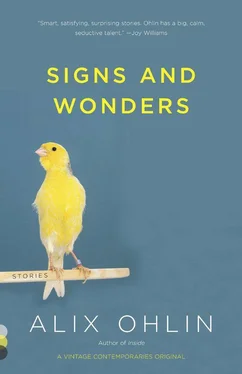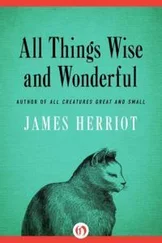Alix Ohlin - Signs and Wonders
Здесь есть возможность читать онлайн «Alix Ohlin - Signs and Wonders» весь текст электронной книги совершенно бесплатно (целиком полную версию без сокращений). В некоторых случаях можно слушать аудио, скачать через торрент в формате fb2 и присутствует краткое содержание. Год выпуска: 2012, ISBN: 2012, Издательство: Random House, Inc., Жанр: Современная проза, на английском языке. Описание произведения, (предисловие) а так же отзывы посетителей доступны на портале библиотеки ЛибКат.
- Название:Signs and Wonders
- Автор:
- Издательство:Random House, Inc.
- Жанр:
- Год:2012
- ISBN:9780307948649
- Рейтинг книги:3 / 5. Голосов: 1
-
Избранное:Добавить в избранное
- Отзывы:
-
Ваша оценка:
- 60
- 1
- 2
- 3
- 4
- 5
Signs and Wonders: краткое содержание, описание и аннотация
Предлагаем к чтению аннотацию, описание, краткое содержание или предисловие (зависит от того, что написал сам автор книги «Signs and Wonders»). Если вы не нашли необходимую информацию о книге — напишите в комментариях, мы постараемся отыскать её.
Signs and Wonders — читать онлайн бесплатно полную книгу (весь текст) целиком
Ниже представлен текст книги, разбитый по страницам. Система сохранения места последней прочитанной страницы, позволяет с удобством читать онлайн бесплатно книгу «Signs and Wonders», без необходимости каждый раз заново искать на чём Вы остановились. Поставьте закладку, и сможете в любой момент перейти на страницу, на которой закончили чтение.
Интервал:
Закладка:
It wasn’t that he didn’t want Bruno here. The whole week he’d been nervous, cleaning up the apartment and rearranging the office; he even found himself, bizarrely, going on a diet, wanting both his place and his person to look their best. But he was never confident about any communication with Inès, who tended to listen to other people’s points of view and then do whatever she wanted. This free-spirited determination was part of her charm, and probably also the reason why she’d never married. When they’d met and had their fling, he was on vacation in Paris, recovering from his divorce. Inès had shown him a great time, and he remembered laughing so hard that his stomach muscles hurt. They got really drunk night after night and smoked a ton of pot and had sex in a cemetery. They agreed it was just for fun, a weeklong thing, a release they both needed. Three months later she called to say she was pregnant and going to keep the baby.
The contours of a new life sketched themselves in Art’s vision, a French wife, an apartment in Paris, a child. “Should I, uh, move over there or something?”
“Don’t be stupid,” Inès said. “You don’t need to do anything. I am thirty-five, this is my chance for mothering. I want to grab this.”
She’d cleared him of all obligations, but he hadn’t cleared himself. So he’d taken to spending his summer vacations in France to be with his round-cheeked, blond-haired son, who treated him like the distant relative he supposed he was. Bruno always seemed happy enough to see him arrive and never particularly distressed to see him go. And Inès was also happy — motherhood agreed with her. When her parents died she inherited a stone house outside of Aix, and the summers there were like living in a Cézanne, all haystacks and brilliant sunsets. It wasn’t how Art had ever expected to become a father, but it wasn’t bad.
He fell asleep in his armchair, the laptop balanced on his knees, and when he woke up Bruno was in the kitchen making eggs. He moved confidently around the kitchen in his tank top and jeans, a cigarette pursed between his lips. He looked like a forty-year-old ex-con fresh from the joint. Bruno nodded for him to sit down, doling some eggs onto a plate and adding buttered toast. There was also coffee.
“Thanks,” Art said.
Bruno shrugged Gallically. “I always make for my mother.”
“That’s nice of you.”
“Her cooking is garbage. I cook so I can eat.”
Bruno sat down, throwing his cigarette into a glass of water he’d apparently designated for that purpose, since three butts were already floating there. The eggs were creamy, the coffee strong. By the time Art had taken two bites, Bruno had finished his. Then he leaned back in his chair and lit another cigarette.
“So,” he said. “Are you still sick?”
Art met his gaze. “No, I’m well now.”
“But you had it … removed?” The boy’s hand fluttered ambiguously around the seat of his chair.
The question started as bravado, but ended in nerves. Art thought, You little fucker. He didn’t stop staring at the boy, whose gaze finally dropped to the ground.
“I had one ball removed. You know what a ball is, right?”
“Of course I know.”
“What’s it called in French?”
“Testicule.”
“So, I still have one test-ee-cool,” Art said, drawing out the pronunciation. “Which is enough.”
“Enough for what?”
“For whatever,” Art said tightly.
Suddenly they both laughed.
Bruno shook his head, grinning. “It’s funny how you say testicule. ”
“I know. I speak French like Inès cooks.”
His kid laughed again, and the tension between them eased. Bruno cleared the table and washed the dishes, which impressed Art, and he also emptied the butts out of the glass and set it aside, marking it as his ashtray for the summer. They spent the rest of the day in the neighborhood, Art showing him the grocery store, the park, the Italian social clubs where old guys hung out, monitoring the street traffic. For dinner they ate outside at a café, Bruno ordering and being served, without question, a glass of red wine. Art remembered himself at fifteen, pimpled and sweaty, with three hairs on his upper lip that refused to coalesce into a mustache, agonizing for hours over an excuse to call Alison Kozlowski on the phone. Bruno couldn’t have been more different. But they talked easily enough, laughing about Inès, remembering a trip they’d taken to Marseilles when Bruno was very young. When they got home, Bruno went to sleep and Art checked his e-mail, finding an enigmatic one-line response from Inès: Why don’t you see what happens?
The first week was great. They went to the movies, out to dinner, to Coney Island. In the mornings they drank coffee and read the Times in the kitchen. Art had taken the week off and was glad he had, not only because a break from work was always welcome. When he’d met Inès, he was an editor at a leftist magazine. He’d made it sound like a bigger magazine, and his own position there more important, than reality could support — foolishly, in retrospect, because Inès couldn’t have cared less. In the manner of many intellectual Europeans he’d met, she somehow cobbled together a life out of occasional freelance work and government assistance and for months at a time appeared to do nothing at all. Art’s magazine, inevitably, had folded. Now he was editing online content for a website designed for seniors, who ironically were probably the last people alive still buying actual magazines. His twenty-two-year-old assistant did the blog aggregating and headline writing while Art fixed comma splices and assigned pieces on investment strategies to protect your nest egg and the health benefits of broccoli. In staff meetings he was often the oldest person in the room, and sometimes the young faces would turn to him automatically, like tender plants to the sun, when questions about “what seniors wanted” arose. Art was forty-seven and it made him want to scream, but he held his tongue. Too many of his friends were out of work.
Bruno had a little notebook that he took with him everywhere, often spending an hour or two making sketches in a café or jotting down his observations of Brooklyn. Occasionally he left it around the apartment, not seeming particularly protective of it, and Art couldn’t resist taking a look. Most of his sketches seemed to be of women (clothed or naked) or of homeless men (clothed, thankfully). He also made a lot of lists: the restaurants they’d been to in Carroll Gardens; movies they’d seen; other mysterious two-word phrases Art decided had to be band names or songs, because in themselves they made no sense.
beneficial worm
power sham
lettuce amazement
trifecta bin
shirts trophy
Since he didn’t want to admit he’d looked, Art couldn’t ask him about these. But he was often tempted to reference the phrases — to exclaim, “Lettuce amazement!” over dinner, for example, or to say, “Shirts trophy,” when he handed Bruno a stack of clean laundry — and found they stuck in his head, sometimes popping into his consciousness at night as he was falling asleep.
He was impressed by Bruno’s ability to get around New York, by the attention he paid to the subway map, by his friendliness to people in stores. He’d hang out on the stoop of the building for hours, smoking cigarettes and petting the landlady’s beagle. As this kept the dog — ordinarily a howling, roly-poly monstrosity — quiet, he grew popular among the neighbors. One of them told Art, as they chatted on the street corner, how lucky he was that Bruno had come to stay.
“Yeah, Bruno’s great,” Art said.
Читать дальшеИнтервал:
Закладка:
Похожие книги на «Signs and Wonders»
Представляем Вашему вниманию похожие книги на «Signs and Wonders» списком для выбора. Мы отобрали схожую по названию и смыслу литературу в надежде предоставить читателям больше вариантов отыскать новые, интересные, ещё непрочитанные произведения.
Обсуждение, отзывы о книге «Signs and Wonders» и просто собственные мнения читателей. Оставьте ваши комментарии, напишите, что Вы думаете о произведении, его смысле или главных героях. Укажите что конкретно понравилось, а что нет, и почему Вы так считаете.












